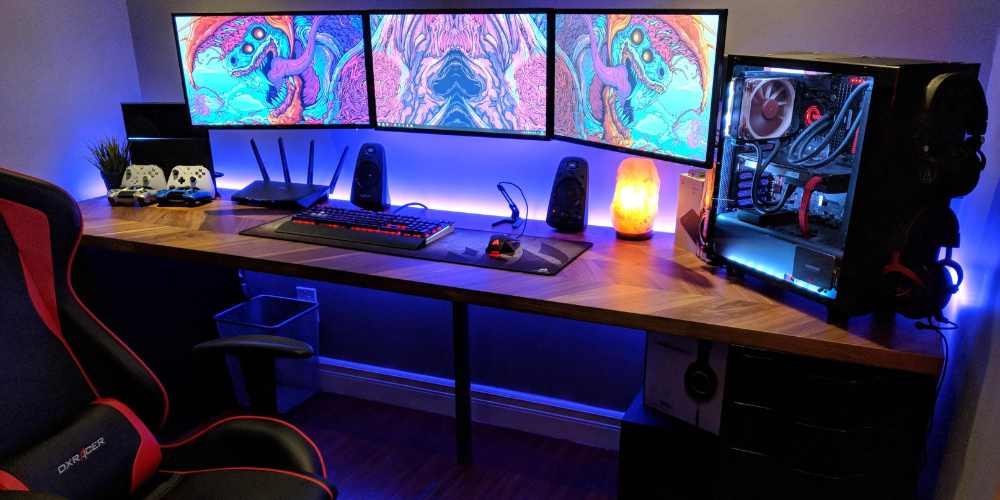
The Evolution of Gaming: Moving from Solitary to Social Engagement
Historically, video gaming has often been regarded as a solitary pursuit, a cave of escapism from the real world. However, the gaming scene has starkly evolved with time, unfolding numerous avenues for interpersonal interaction. Games are no longer just an individual's pastime; they have grown diversified, opening up opportunities for friendly competition and cooperation between players.
The emergence of multiplayer and co-op modes has transformed erstwhile virtual spaces into thriving social hubs. This alteration in gaming design has caused a ripple effect, drastically influencing our views of gaming culture.
Going Multiplayer: Fostering Real-Time Competition and Cooperation
Multiplayer games have opened up an entirely new horizon in the gaming landscape, allowing numerous players to participate simultaneously, either in opposition or in collaboration, towards a shared goal. These gaming modes provide an extraordinary platform where players can pit their skills against actual humans rather than computer-operated characters.
The defining feature of multiplayer games is the opportunity they provide for experiencing this immersive world, where one can interact with different characters — a quality that significantly sets them apart from single-player games.

10 Interesting Facts About Multiplayer Games
A selection of interesting facts about multiplayer games:
- Multiplayer games have created their own subculture and language, with the use of acronyms, game-specific terms, and other jargon that only fellow gamers would understand.
- Many people have turned playing these games into a career through esports (competitive gaming) or streaming gameplay on platforms like Twitch. Esports tournaments often have prize pools reaching millions of dollars.
- Multiplayer games are not just about competition; many individuals have formed lasting friendships and communities through these games.
- Studies show that playing multiplayer games can actually improve hand-eye coordination, problem-solving skills, and teamwork.
- Several multiplayer games, such as Minecraft and Roblox, are being used for educational purposes, teaching kids everything from coding to physics.
- Some games have replicated real-world events in-game. For instance, World of Warcraft experienced a "Corrupted Blood" pandemic, which has been studied by experts as a model for how diseases can spread.
- In South Korea, where multiplayer games are immensely popular, there are 24-hour internet cafes known as PC bangs, where people can come and play games for hours on end.
- Multiplayer games have been studied for their potential to help reduce stress, improve mental health, and build social skills.
- MMO economies have become so impactful that some have a better exchange rate with real world money than some actual countries.
- Some games like World of Warcraft have "persistent worlds," which continue to exist and evolve, even after a player logs off.

The Rise of Co-op Mode: An Engagement Fostered by Unity and Team Spirit
Cooperative play, also known as co-op mode, comes with its distinctive charm. In this mode, players join forces against challenging quests requiring strategic planning, collaboration, and communication. Unlike competitive multiplayer games where the glory is individual, co-op mode emphasizes team spirit and camaraderie. This shift towards shared success and unity is what has contributed to the significant popularity of this genre among gaming aficionados.
Connecting Through Gaming: The Offline vs. Online Debate
Video games today offer both online and offline engagement modes, both of which have contributed to enhancing the player experience. The classic 'couch co-op' offline mode enables physical proximity and bonding over shared objectives in a casual living room setup. In contrast, online multiplayer modes, powered by faster internet connectivity and reliability, reunite distant friends and connect strangers via shared gaming experiences.
Social Impact of Multiplayer and Co-op Gaming
With their social interactivity, multiplayer and co-op modes have turned the gaming world on its head, transforming games into dynamic social platforms, allowing players worldwide to connect, collaborate, and forge relationships. The virtual worlds have become a fertile ground for friendships, rivalries, alliances, and communities to flourish. These engaging modes encourage and nurture empathy, cooperation, and leadership while breaking down barriers that might exist in traditional social interactions, thereby proving that the influence of video games is not limited to 'mere gaming.'
A Paradigm Shift in the Realm of Gaming: Transforming from Passive Amusement to Dynamic Social Collaboration

Thriving through the digital age, online multiplayer and cooperative, or 'co-op,' games are beginning to redefine conventional viewpoints concerning the character of video game culture. By reshaping the traditional structure of gameplay from a solitary interaction with a console or screen to an interconnected network of human interaction, these digital games are dismantling long-established beliefs.
Known for their collaborative and sociable aspects, these game modes allow millions of players to connect across borders, share experiences, and compete or cooperate in an immersive environment. By providing a platform for real-time engagement, they act as a conduit that removes geographical barriers, bringing together individuals from a multitude of diverse backgrounds, cultures, and experiences and thus fostering a global gaming community.
Indeed, online multiplayer and co-op games are rapidly rising as an integral facet of our contemporary digital culture. They excel in demonstrating that the function of video games extends past the realm of pure amusement or recreation. In fact, these pervasive games also underscore a more profound implication.
Far from being merely electronic distractions, video games now possess the capacity to create extensive online communities. They bring together individuals sharing common interests, enabling communication and connections that may otherwise have been elusive or challenging. They foster a bridge of camaraderie and social interaction among players around the globe. Promoting collaborative efforts, competition, and strategic alliances, the world of online multiplayer and co-op games cultivates a lively environment where cooperation and competition coexist.
They infuse elements of teamwork and shared triumphs, thereby enriching individual experiences through the collective channeling of efforts, skills, and resources. As video game culture transitions from a symbol of passive entertainment to an active portal for social engagement, we are witnessing a shift in attitudes toward video gaming.
The perception of video games as simply time-wasting diversions is gradually fading, making way for a more nuanced understanding of them as powerful tools for fostering social activity, enhancing interpersonal communication, and promoting cooperative experiences among users worldwide.
On a Concluding Note: Gaming, More Than Just Screen Time

This expanded exploration delves into the phenomenon of multiplayer and co-op modes in contemporary video game culture. It traces their history and the consequent surge in their popularity within the gaming community. It illustrates the transformative journey of gaming - from solitary gameplay to more socially engaging activity.
It emphasizes how multiplayer and cooperative environments mirror real-world human communication and socialization within digital confines, enabling gamers to establish bonds through mere button presses. As a result, these modes have positioned themselves not just as pastime activities but as significant drivers of interpersonal communication and relationships for gamers worldwide.